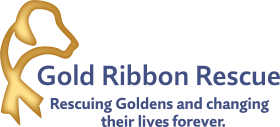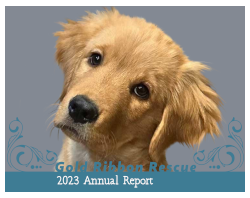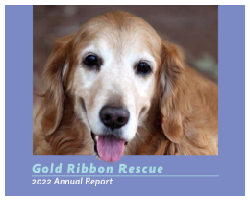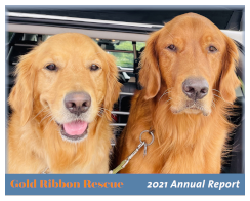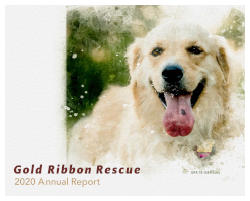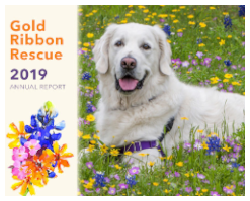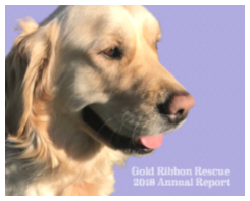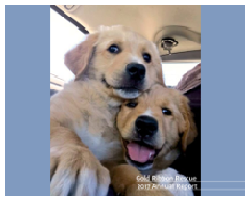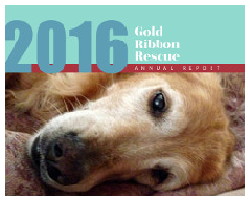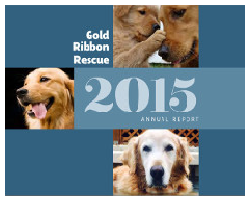Mission Statement
Gold Ribbon Rescue, Inc. (GRR) was founded in 1998 to meet three objectives. We are a non-profit 501(c)(3) organization as recognized by the IRS. GRR's main function is to provide a network for sheltering, rehabilitation and placing Golden Retrievers in permanent homes in Central Texas. GRR’s second function is to provide public education about responsible dog ownership and, in particular, about the Golden Retriever breed. Third, GRR provides a forum for Golden Retriever fanciers to meet.
GRR members assist each other with advice and information about training, health problems, and local dog activities. Occasional social activities include the dogs and give GRR members and friends a chance to meet and enjoy the company of Golden Retrievers.
Gold Ribbon Rescue is an all volunteer nonprofit corporation. Member dues, adoption fees, fund raising activities and donations finance its activities. Donations are tax deductible. GRR does not discriminate based on race, religion, age, national origin, language, sex, sexual preference or physical handicap.
Annual Reports
What are rescue dogs like?
No two dogs, even of the same breed, are ever alike. All of our rescue dogs are friendly, wonderful dogs that desperately need love, attention and a second chance at life. Many are housebroken and some have obedience training. Most rescue dogs are between 6 months-10 years old. A common misconception about older dogs is that they are “untrainable”; Goldens, however, are so eager to please that they are very trainable at any age. They may actually learn more easily when they are older, more mature and less “puppylike”. (See Puppy Info & Golden Gems)
Many rescue dogs come from owners who no longer want to care for them. Usually, these people bought a cute fluffy puppy without realizing the cute puppy would soon become a large, hairy, adult dog who would need lots of time, training, love and attention. This is often when they decide to get rid of the dog because “they don’t have time for it.” Occasionally owners have to place their Goldens because of allergies or because they are moving somewhere the dog will not be welcome.
The rest of our dogs come in as strays from shelters. Occasionally we are able to shut down a “puppy mill” or backyard breeding operation. One such special rescue was the “Tie a Gold Ribbon” rescue in 1998, which resulted in the rescue of nearly 100 dogs! We do not place known biters or growlers. Any dog will bite if provoked enough, but any dog we know to be aggressive is not placed through our program.
What services does GRR provide?
GRR accepts dogs that are identifiable as Golden Retrievers. Rescued dogs are taken to a licensed veterinarian to receive a thorough check-up. Necessary treatment is performed including inoculations, medication, heartworm treatment or preventative, flea/tick preventative and worming. Intact animals over 6 months old are spayed or neutered.
A GRR volunteer or private kennel houses the dog until a suitable adoptive home can be found. This foster care may include housebreaking, crate and leash training, and some basic obedience. The behavior of the dog in a friendly environment is evaluated for adoption placement.
Rescued dogs are offered for adoption to qualified families. The adoption fee charged for the dog helps cover the costs of its care. If a dog is physically or temperamentally unsound and cannot reasonably be rehabilitated, it is euthanized.
Does GRR buy dogs?
No.
Because of the unchecked breeding of many dogs and the failure to spay/neuter most pets, the golden population has grown to dismal proportions. In addition, most Goldens are sold by persons who (1) do not take the time to educate the buyers about the care of large dogs, (2) do not require spay/neuter contracts and (3) do not provide health guarantee contracts for the lifetime of the animal.
"Puppy Mills" and irresponsible backyard breeding will continue as long as they are profitable and we do not contribute to their success by buying their dogs. We only pay appropriate shelter and impound/adoption fees.
Is GRR a kennel facility?
Gold Ribbon Rescue does not own or operate a kennel facility, nor do we provide services as a shelter facility. All of our dogs in foster care are homed in individual volunteer foster homes within the Central Texas area. Individual dog meets occur only once an applicant is approved as an adoptive home, and our matchmakers have matched the needs of an available foster dog with the needs of the approved adoptive home.
Individuals who have successfully completed the adoption process move to the approved applicants list in the order applications are approved; priority is not given to any one approved applicant.
Am I ready for a dog?
Ask yourself these questions.
Does my lifestyle permit me to care for, train and spend quality time with a pet?
Goldens demand love from their owners, and a rescued dog often needs extra patience and affection to overcome problems created in its earlier life. They must be groomed regularly, exercised daily, and trained to be good citizens. A busy household, where people are seldom home and always in a rush, is not a good home for a sociable Golden Retriever.
Am I prepared for the financial burden of veterinary care, quality food, proper equipment and training for the next 10-15 years (avg. lifetime of a Golden)?
The Humane Society estimates that it costs owners about $850 per year to feed and care for a dog the size of a Golden Retriever. Every dog needs year-round heartworm preventative (Canine Heartworm Disease) and an annual check-up by a veterinarian including inoculations. Some dogs have health problems that require continuing medication or surgery. All dogs deserve a healthy diet of well-balanced dog food formulated for their needs. They also need a collar, leash, comb, brush, toys and food and water bowls. Owners must license their dogs according to local regulations. GRR strongly recommends that the adoptive family attend obedience classes with their Golden, as it will greatly improve the quality of life for both pet and owner.
Do I have the facilities to keep a Golden Retriever?
An adult Golden of 60-80 pounds is a big hairy handful! They shed their beautiful coats, sometimes profusely, and are not suited to the immaculate housekeeper. Goldens are happiest living in the house, with the family, so they must be housebroken and trained to obey the house rules. Owners must be willing to keep their dog in the house while they are away. GRR recommends crating or baby-gating a golden until it is trustworthy and can be allowed free roam in your home.
Goldens need regular exercise to stay healthy. GRR’s fence policy is as follows: GRR requires a fenced yard (dog parks do not qualify). If GRR makes an exception to allow an apartment dweller to adopt (or foster) without a fence; you must live on the ground floor or have access to an elevator for the dog. GRR does not accept an invisible fence as an appropriate fence. Additionally, GRR may consider placing a dog age 8 or older in a residence without a fence. Note: a slightly younger dog may be considered on a case-by-case basis. (Why Do I need a Fence?).
How do I adopt a rescue dog?
The first step is to fill out the adoption application on our website. Prospective owners are carefully screened before they are allowed to adopt a dog. GRR has a three-step interview process, which consists of two phone interviews and a home visit. We want to make sure that a Golden Retriever is for you – they’re not for everyone! We encourage you to read about the golden breed prior to making a decision to adopt a golden. Many books are available and we recommend The Golden Retriever by Jeffery Pepper and Second Hand Dog by Carol Lea Benjamin.
Adoptions are followed up by calls and visits by a GRR volunteer. Assistance and advice is offered to help the adoptive family and rescue dog adjust to each other. We work very hard to ensure every GRR dog tale will have a happy ending.
Working with other rescue groups
While GRR's rescue and rehoming efforts are localized to the Central Texas area, due to large influxes of Goldens and a shortage of foster space, we do at times reach out to other Golden Retriever Rescue groups both within and outside of the state of Texas.
In building reciprocal working relationships with other Golden Retriever rescue groups with similar policies, we increase our ability to reach out to a greater number of dogs than we could as a single organization.
What is GRR membership and how do I join?
GRR is staffed entirely by volunteers, people who love Goldens and want to help other Goldens get a second chance at a happy life. Members contribute what they are best able to give: providing foster homes, transporting, exercising or bathing dogs, answering phones, home visits, fundraising, data entry and record keeping, helping at special events, etc.
We welcome your interest and encourage you to visit our website for more information about GRR, our activities or Golden Retrievers in general. Click membership information for more information.
